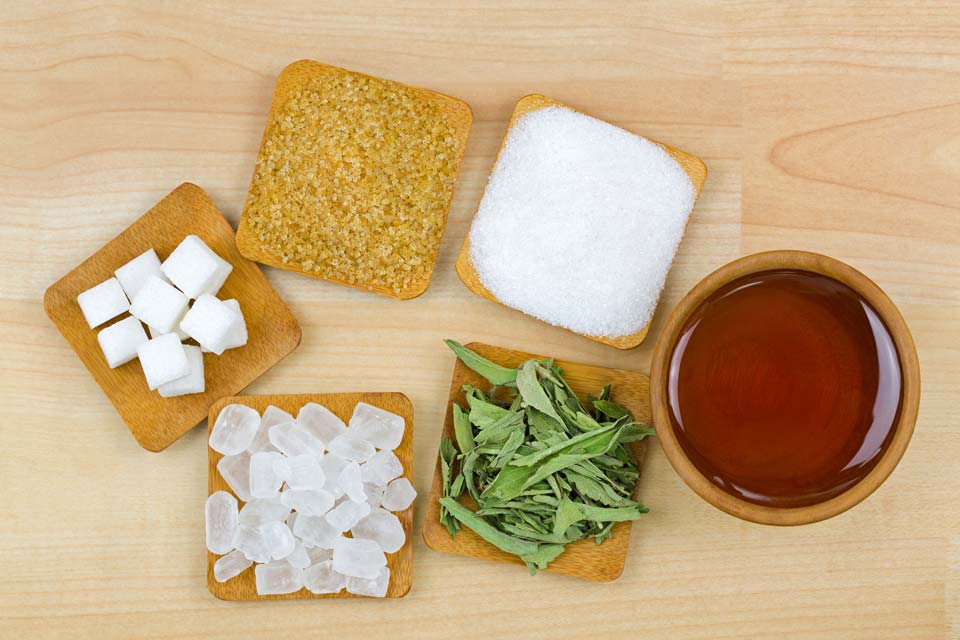Stevia and Diabetes

Using sugar as a sweetener can be a dangerous choice for people with diabetes. The good news is that diabetics now have a multitude of options for sweetening their morning cup of coffee compared to years ago. In the U.S., that choice has expanded to include a component of stevia (rebaudioside). Stevia's stevioside compounds are also approved by European food authorities, and stevia has been used as for centuries in South America.(3, 5)
Safety Concerns About Artificial Sweeteners
Concerns about artificial sweeteners have fueled research into natural alternatives. Worries began with the earliest artificial sweetener - saccharin. Once upon a time, saccharin was the only sweetener available for diabetics and for those looking to cut calories (in the United States). But in 1972, saccharin was removed from the FDA's "generally recognized as safe" (GRAS) list.(36, 37)
The problem was that saccharin is it's known to cause cancer in animals. The National Toxicology Program later determined (in 2000) that it's no longer a potential carcinogen in humans. However, during the almost 30 years in between other sweeteners were developed and approved.(36, 37)
The Aspartame Controversy
Side effects and health conditions linked to these newer sweeteners, especially aspartame, continue to be reported. Some complaints are supported by science. For example, excessive levels in the blood of one of the byproducts of ingesting aspartame can cause brain damage. The FDA suggests that only people with certain rare genetic disorders (or the fetuses of pregnant women with these disorders) could accrue high levels of this aspartame byproduct.(36)
Food safety organizations currently dismiss concerns raised from studies on aspartame (e.g., the build-up of formaldehyde in the brain or increased cancer risks). They, and other scientists, say that aspartame is safe. The basis for their conclusion includes the following points:(36-38)
- Saying that formaldehyde, a byproduct of aspartame, can't build up in the body because its half-life is only 1.5 minutes. Despite evidence in animal studies that shows it does accumulate in tissues, authorities argue it's inconclusive.
- Stating that results of studies associating aspartame with cancer are inconsistent.
Other researchers and scientists do not support the conclusion that aspartame is safe. Some suggest that there's not enough clinical data to encourage using aspartame. It's even been asserted that food authority reviewers have conflicts of interest that may bias their support for aspartame (some work/worked with food manufacturers that use the sweetener). So, while the EFSA and the FDA considers aspartame to be a safe sugar alternative, there's still an unsettling amount of research that suggests otherwise. It has left diabetics with the unsavory feeling that they could possibly be trading one health problem for others.(3, 39-41)
A Safer Sweetener?
On the other hand, stevia compounds have been safely used for decades as a sweetener in Asian countries and Europe. The whole herb has been used for centuries as both a sweetener and home remedy in South America. Even researchers who say there's not enough safety evidence on non-nutritive sweeteners note that there aren't negative complaints from people who use stevia products. In fact, some mention that stevia compounds may actually be beneficial for diabetics and those trying to lose weight.(38, 42, 43)
Effect on Blood Sugar - Compared to Other Natural Sweeteners
Until recently, the approved natural alternatives in the U.S. were known to have an undesirable effect on blood glucose levels and as many (or more) calories than sugar:(44)
| Per Tablespoon of…. | Calories | Carbohydrates (in grams) | Sugars (in grams) |
|---|---|---|---|
| Sugar(69) | 15 | 4 | 4 |
| Pure Maple Syrup(70) | 52 | 13 | 13 |
| Maple Sugar(71) | 44.25 | 11.4 | 10.6 |
| Dark Corn Syrup(72) | 57.2 | 15.5 | 15.5 |
| Light Corn Syrup(73) | 60 | 15 | 5 |
| Honey(74) | 63.8 | 17.3 | 17.2 |
| Agave syrup(75) | 42.5 | 10.5 | 9.4 |
Evidence of Stevia's Benefits for People with Diabetes
Fortunately, the two primary parts of stevia that make it sweet don't raise blood glucose levels like most natural sugars do. Research indicate some stevia compounds may even stimulate insulin and help normalize blood sugar levels in diabetics. Results of clinical trials also suggest stevioside and dried whole stevia leaves can help control blood sugar levels after eating.(16, 45, 68, 76)
However, those using commercial products made with stevia's rebaudioside-A compound for these effects should note that research results are not promising. Preclinical lab studies show that rebaudioside A stimulates insulin secretion. Unfortunately, animal studies and one controlled clinical trial indicate this stevia compound had no effect on insulin or blood sugar levels.(45, 66-68)
Many hail stevia compounds as the best alternative to sugar for diabetics and non-diabetics alike. Certainly, the potential health benefits of this simple herb bear watching. We recommend that individuals considering the use of stevia should consult their health care practitioner before doing so. Stevia is an herb, and many herbs can interact with prescribed medications. Diabetics should never stop or alter their existing treatment plan without speaking with their health care practitioner first.


